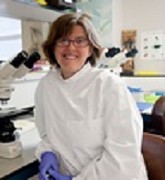Discussion
In spite of years of research, commercially viable recombinant sub-unit vaccines against parasitic nematodes have yet to be realised. This talk details progress in development of a recombinant vaccine for control of Teladorsagia circumcincta, the major parasitic nematode of small ruminants in temperate regions. The vaccine is based on antigens selected using both immune-proteomic and functional analysis of worm excreted/secreted molecules. An eight-protein cocktail has now been tested in sheep on several occasions and parasitological and immunological parameters compared in immunised versus control sheep subjected to repeated infections designed to mimic field conditions. Varying levels of protection have been observed in the different trials, with variation within and between groups identified. This presentation will cover the antigen selection strategy, the immunisation trials and the recent immunological and transcriptomic analyses that have been undertaken to try identify sources of variation in vaccine responsiveness. Steps being taking to optimise the prototype to mitigate variation in responsiveness and to improve the vaccine’s commercial viability will also be described.

